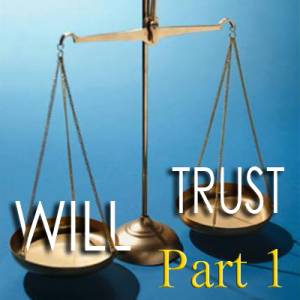Difference Between Will and Trust – Pt 1
Categories: Estate Planning, Living Trusts, Wills
 “Diane, what is the difference between will and trust?” This is one of the most frequently asked questions we trust and estate attorneys get asked! The differences between the two are significant and honestly, while this article is a handy reference for general knowledge, I advise you to check with a specialist before investing your valuable time and hard-earned money going it alone and making decisions that “make sense” to you re the difference between will and trust.
“Diane, what is the difference between will and trust?” This is one of the most frequently asked questions we trust and estate attorneys get asked! The differences between the two are significant and honestly, while this article is a handy reference for general knowledge, I advise you to check with a specialist before investing your valuable time and hard-earned money going it alone and making decisions that “make sense” to you re the difference between will and trust.
A legal professional knows the intricacies of the law and has years, even decades, of experience in human nature and the complexities of the judicial system. It is always best to work with a lawyer who can help you properly protect your assets and prepare the legally binding documents that make certain YOUR wishes are fulfilled as intended. Their lifetime of expertise that is worth the price of admission. Pay now, or your estate pays later. The smart money is on a good attorney NOW so that your estate is actually there for your loved ones to EASILY receive down the road.
Consider this a primer on the “difference between will and trust” and go from there.
Difference Between Will and Trust – The Will
When looking at the difference between will and trust, know that a will is there so you can state your wishes and have the last word. A will distributes property to your chosen beneficiaries and can be used to name specific guardians for your minor children. It can also name property managers for any property going to a minor child. A will lets it be known how you would like to handle any remaining debts or taxes. A will allows you to name an executor, is revisable and requires witnesses to render it valid. Depending on the state in which you live, you may need 2-3 witnesses over the age of 18. The witnesses should NOT be named as heirs; as there is a potential conflict of interest there. At the very least, make sure you have a will.
Probate – A Key Difference Between Will and Trust
In the absence of a will, the COURT will make important decisions, on your behalf; like those mentioned above. In addition, probate, a lengthy/costly legal process that determines the validly of a will, will be required. Anyone who has gone through it knows just how significant this difference between will and trust is, and just how protracted it can become.
To have a will is certainly better than not have one at all; however, once you really understand the difference between will and trust you may see that having a trust is a better option for you. If you think that a simple will is where you want to start, great! Please keep in mind that it too has details that are best addressed/advised by a legal professional.
Trusting the Internet on the Difference Between Will and Trust
The internet is a great place to get started. And while there is plenty of info out there on the internet on the difference between will and trust, and much of it is solid, there are also subtle details that could trip you up. More accurately, could trip-up your estate… LATER! Feel free to familiarize yourself online and get some education on the basics in your jammies at 2am. However, in the morning, call a good trust and estate lawyer!
We trust and estate attorneys have seen it all, and know that the things you miss now can equal time, money, frustration and broken relationships down the road. Make sure it’s done right the FIRST time!
And check back on January 13, 2015 for The Difference Between Will and Trust – Part 2
If you live in San Jose, Peninsula or South Bay Area, feel free to be in touch! I am simply a phone call or email away! You are welcome to print this Free 30 Minute Legal Consultation and use it to get some of your initial questions answered at no charge. I look forward to hearing from you.
Or you can read more about the different types of wills here.
 Diane M. Brown, Esq.
Diane M. Brown, Esq.
Working every day to keep my clients out of court!
It’s your money… Let’s keep it that way!
Call 408-364-1234
This blog contains general information and is not meant to apply to a specific situation. Please seek advice of counsel before proceeding as each case is unique.






No comments yet.